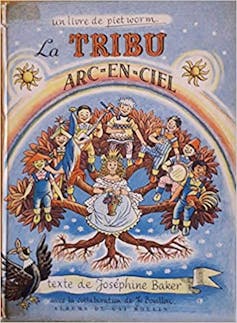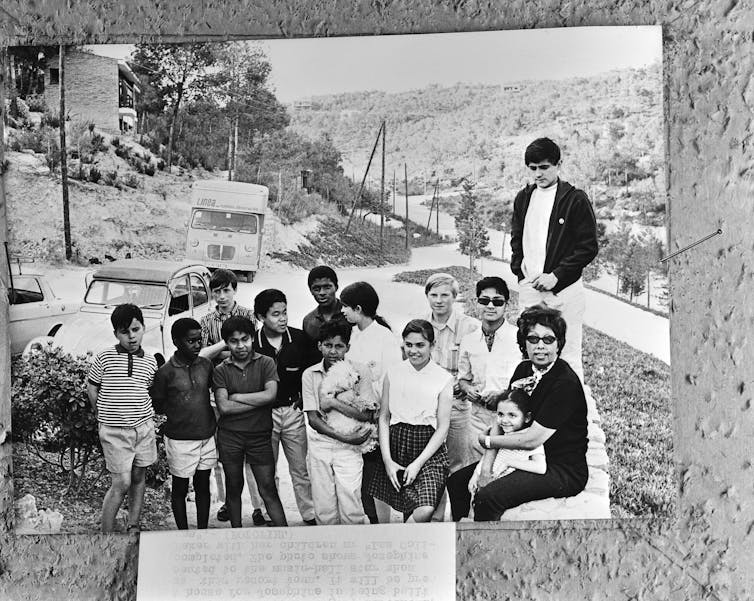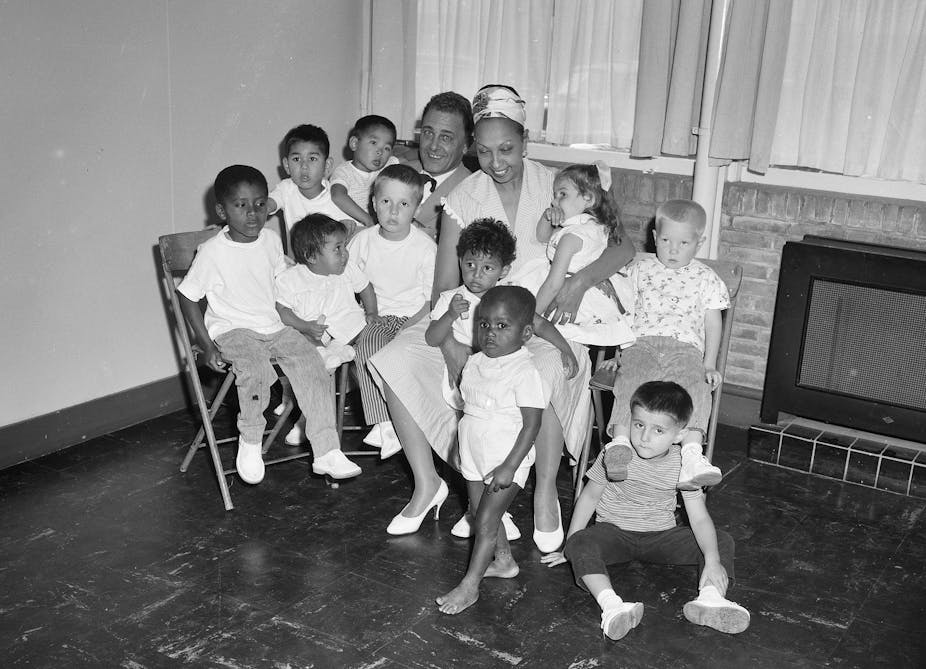Among all the causes championed by Josephine Baker, her child advocacy work isn’t the one that is most remembered today. However, her actions helped to popularise international adoption.
On 30 November, Josephine Baker (1906-1975) will be inducted into France’s Panthéon. An official statement by the Élysée Palace describes her as “a member of the Resistance and tireless anti-racist activist […] involved in all the battles that unite righteous and willing citizens in France and across the world”. But of all her life’s commitments, her support for child advocacy and universal brotherhood is less frequently remembered. Nevertheless, her actions in this area influenced public opinion and helped popularise international adoption.

After serving in the Resistance during WWII, Baker married conductor Jo Bouillon (1908-1984). Childless and in her forties, she set about building a family of children of all skin colours who would be raised in brotherhood and universalism.
In 1954, she came back from a tour in Japan with Akio and Teruya (the latter was renamed Janot in France). Later, she brought home Jari from Finland and Luis from Colombia. The couple subsequently adopted two young French children out of the welfare system, Jean-Claude and Moïse. Then, even with Bouillon feeling that another adoption would be madness, two more children were welcomed into the family in 1956. This time coming from war-torn Algeria, Brahim (who became Brian) was born to Berber parents and Marianne – the couple’s first daughter – was born to a French couple.
After her West Africa tour the following year, Baker brought back an Ivorian baby by the name of Koffi. Then in 1959 came the Venezuelan Mara, who was followed by Noël, so named after he was found in a crib in a Parisian street at Christmas time. Some years later, Stellina arrived, having been abandoned at birth in France by a Moroccan friend of Baker’s. She became the second daughter and the 12th child of the “Rainbow Tribe”.
Thanks to her fame, Baker could easily find go-betweens to help build her family at a time when the practice of “inter-country adoption” was not regulated on a global level. The forerunners of international adoption would often travel abroad in search of a child to adopt. This was the case for most of the 12 children, who were adopted by Mr. and Mrs. Bouillon under the French Family Code of 1939.
A family in the limelight
For Josephine Baker:
“[There was] no point in adopting children of every colour to be kept away from everyone else! They must be made visible so that people can see that it is in fact possible; that children from different races, raised together as siblings, have no animosity; that racial hate is not natural. It’s an invention by mankind.”
The children were all brought up in accordance with their heritage and the religions that Baker assigned to them. Janot was Buddhist, Jari Protestant, Koffi animist, Moïse Jewish, and so forth. Jo Bouillon wrote them a universal prayer of brotherhood:
“O Father, our Good God, grant […] that our brothers and sisters across the world may show greater love for each other, with the peace, understanding and tolerance that You inspire in us each day through the love that You offer us.”
Bouillon and Baker decided to turn their Château des Milandes estate into a tourist centre, as a living tribute to brotherhood between human beings. Along the roads of the Dordogne, signs called drivers to visit this “Village of the World”, the “Capital of Brotherhood”, which hosted 300,000 visitors annually in the late 1950s.
To support the heavy costs of raising such a large family and maintaining the estate, Baker had to perform frequently, and her career soon became intertwined with family life. Baker’s song “Dans mon village” (“In My Village”), set to music by Francis Lopez, was an immensely popular and touching ballad that alluded to her “little ones” (who increased in number with each subsequent recording) and called for universal brotherhood and peace. Alongside her husband, she also co-authored a children’s book, “The Rainbow Tribe” (1957) that was an ode to tolerance and openness toward others.
A 1961 television broadcast, “Le Père Noël chez Joséphine” (“Santa Comes to Josephine’s”), offered a snapshot of happy family life at Les Milandes. In interviews with French and international media, Baker always spoke of her family, her children, and the humanist philosophy that she practised every day.
There were frequent disputes between Baker and Bouillon, however, particularly concerning difficulties in managing the estate, which came close to being sold on a number of occasions. Josephine Baker relied on her image and her family’s popularity in the hopes of saving it, but categorically refused proposals to make a film about her children. “They are here to represent an ideal,” she said, “not to be turned into performing monkeys.”
In 1964, Brigitte Bardot spoke at the end of a televised news programme, appealing to viewers to help Baker and her family. The call was answered by members of the French middle class, intellectuals (such as François Mauriac), political elites (such as Antoine Pinay) and, of course, artists (such as Line Renaud and Dalida). But their combined efforts failed to save the Les Milandes estate and Baker and her family had to leave in 1969.
A unique experiment
After a stint in Paris, thanks to the aid of the Princess of Monaco, the Rainbow Tribe settled at a villa in the Riviera town of Roquebrune. It was at this point that the relationship between the teens and their mother became strained, due to academic difficulties and boarding school stays, compounded by the double burden of coming from elsewhere and having a famous parent. None of them questioned their mother’s vision of universal brotherhood, but they clashed on issues of clothing, hair styles, and ongoing youth trends. Baker, meanwhile, feared that her children would be led astray, in particular by drugs.
When Baker passed away in 1975, her oldest children were in their 20s, some already married with children. Stellina, aged just eleven at the time, was the only one still living permanently with her mother. On the subject of her death, the artist had stated on a number of occasions:
“Once I’m gone, you have to carry on the idea that led me to bring you together.”

By bringing her experiment into the public eye, she hoped that others would follow suit, forming “rainbow tribes” far and wide with children of all colours, creeds and origins. In this regard, her experiment was something of a failure, since other such actions did not become widespread. Nevertheless, adoptions of foreign children saw a considerable increase in France during the 1960s.
Baker repeatedly mentioned the key reason for the strong bonds between her children. She maintained that children should be adopted very young and live together, without having their origins denied, and without individuality being an obstacle toward genuine kinship. Through her vision, the vertical roots formed between the adopted children and “the two Jos” spread outward between the 12 siblings.
In adulthood, the rainbow children have recounted the golden years of their tribe, both in interviews and through their own writing. They have not, however, followed in their mother’s footsteps. Eight of the twelve have had children themselves, but none have adopted – a possibility that was never discussed between the siblings. But they lived the Josephine Baker adventure and are still living it today, as they will be actively involved in the tributes to her mother upon her induction into the Panthéon.
Translated from the French by Enda Boorman for Fast ForWord.


